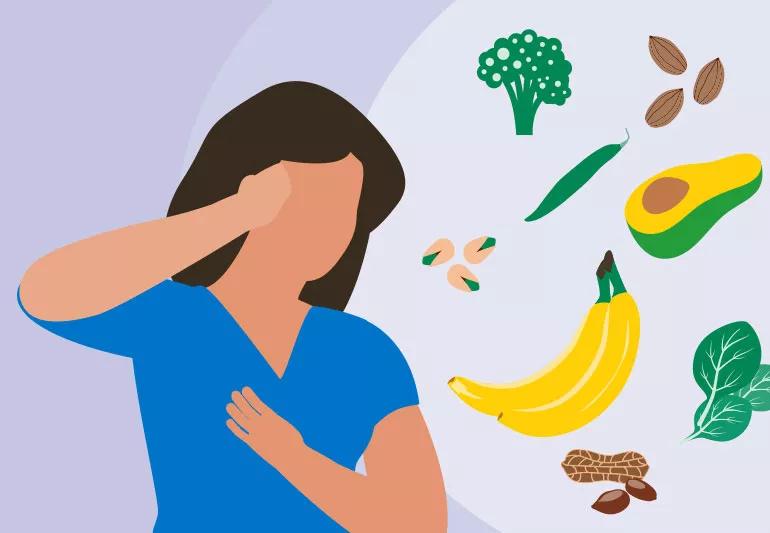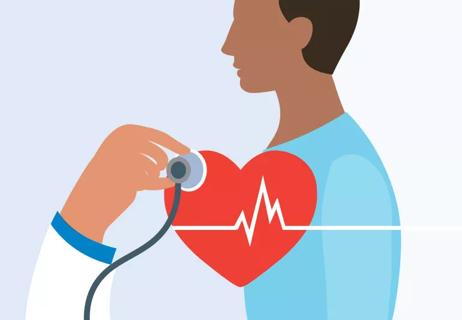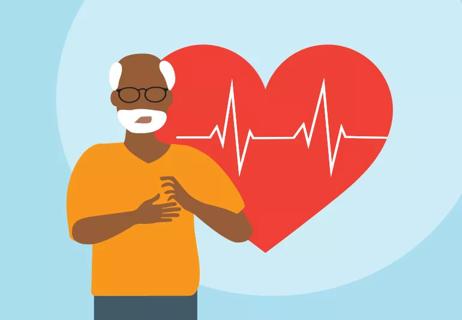Too little magnesium can make your heartbeat go off beat

If you’re prone to heart palpitations, you know what it’s like. The fluttering. The pounding. The racing. The skipped beats.
Advertisement
Cleveland Clinic is a non-profit academic medical center. Advertising on our site helps support our mission. We do not endorse non-Cleveland Clinic products or services. Policy
While heart palpitations don’t always mean you need to make a mad dash to the emergency room, you should seek care quick if your heart rate is elevated, if you feel faint or if you’re in pain.
Otherwise, a skipped beat here and there may be a sign you drank too much caffeine. Or maybe you’re dehydrated after over-indulging at that party last night.
Or maybe you, like 48% of U.S. adults, should consider getting more magnesium in your life.
“Magnesium is an electrolyte that helps to regulate your heart rate,” says cardiologist Tamanna Singh, MD. “When you have a deficiency of electrolytes, it can make your heart speed up.”
We talked with Dr. Singh about the role of magnesium in your heart health and how you can get more magnesium in your diet.
In order for your heart to keep a steady rhythm, there are a number of factors at play. Put simply, your heartbeat is the result of a precisely choreographed electrical system.
It goes a little something like this:
Advertisement
Magnesium comes into play during that slow-down phase in step two. When it comes to your heart health, magnesium’s job is to properly time the gates in your AV node.
Too much magnesium, and the gates move slowly, which can mean your heart will beat more slowly. Too little magnesium and the gates open and close quicker. So, your heart speeds up.
And, then — voila: heart palpitations.
“Essentially, magnesium affects how and when electricity moves through your heart,” Dr. Singh says. “So having a magnesium deficiency, which is very common, can cause you to feel like your heart is beating out of sync at times.”
In addition to its important role in keeping your heart pumping on schedule, magnesium is important for a number of processes throughout your body, like:
The National Institutes of Health (NIH) suggests the following recommended dietary allowances for magnesium in adults, based on sex recorded at birth. Note that recommendations vary if you're pregnant.
| Age | Men | Women |
|---|---|---|
| 14 to 18 years | 410 mg | 360 mg |
| 19 to 30 years | 400 mg | 310 mg |
| 31+ years | 420 mg | 320 mg |
| Age | ||
| 14 to 18 years | ||
| Men | ||
| 410 mg | ||
| Women | ||
| 360 mg | ||
| 19 to 30 years | ||
| Men | ||
| 400 mg | ||
| Women | ||
| 310 mg | ||
| 31+ years | ||
| Men | ||
| 420 mg | ||
| Women | ||
| 320 mg |
In addition to heart palpitations, people who have insufficient magnesium levels may notice other symptoms, like:
Or you may not have any symptoms at all.
First things first: It’s always best to talk to a healthcare provider before making any big changes to your diet or starting a new supplement. If you think you may have a magnesium deficiency, a simple blood test can determine if adding more magnesium is right for you.
If you do have a low level of magnesium, a magnesium supplement can be a quick and easy go-to, but popping supplements isn’t always the best answer, Dr. Singh cautions.
“Oftentimes, it’s in your better interest to change the quality of what you’re eating and try to get nutrients in your foods, rather than supplements,” she says. “There are a lot of common foods that have high levels of magnesium, and they offer other heart-healthy advantages, too, in addition to magnesium.”
The NIH suggests these magnesium-rich foods (in order from higher to lower):
Another reason food is a more reliable source for your magnesium needs is that supplements make it easy to overdo it. And there is such a thing as too much magnesium.
Advertisement
Research shows that if you get too much magnesium in your diet, it’s excreted by your kidneys and you wind up with magnesium-rich urine. No biggie.
Too-high levels of magnesium as a result of supplements or medications, however, aren’t as easily removed from your body. And it can have some ugly side effects, like:
If you and your healthcare provider think a magnesium supplement is the better option for you, just make sure to not exceed the recommended dosage.
Advertisement

Sign up for our Health Essentials emails for expert guidance on nutrition, fitness, sleep, skin care and more.
Learn more about our editorial process.
Advertisement

If you don’t have other symptoms, try using relaxation techniques and vagal maneuvers to calm your heart down

Yes — and depending on the level of dehydration, you may need emergency care

A skipped heartbeat is usually your heart returning to its normal electrical path

Don’t self-medicate with vitamin supplements without consulting a doctor first

High heart rate, pain and dizziness can signal something more serious than a skipped beat

6 ways to avoid heart flutters or calm a racing heart

Keto can reduce blood sugar, but that doesn’t mean it’s right for everyone

Cravings are a natural response to hormonal changes, but giving into them may make you feel worse

Even small moments of time outdoors can help reduce stress, boost mood and restore a sense of calm

A correct prescription helps your eyes see clearly — but as natural changes occur, you may need stronger or different eyeglasses

Both are medical emergencies, but they are very distinct events with different causes